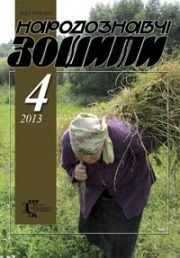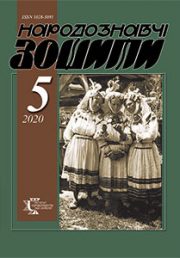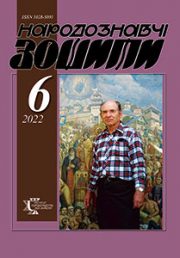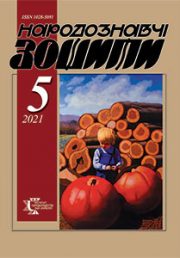The Ethnology Notebooks. 2025. № 3 (183), 702—706
UDK 81:930-057.4Сапеляк
DOI https://doi.org/10.15407/nz2025.03.702
OKSANA SAPELIAK AND MODERN HISTORICAL SCIENCE: TRADITION AND INNOVATION
DIAKIV Volodymyr
- ORCID ID: https://orcid.org/0000-0002-9513-4364
- Scopus ID: 57221646131
- Web of Science Researcher ID: ABI-7728-2020
- PhD of Philological Sciences,
- Senior Researcher Fellow of the Ethnology Institute of the National Academy
- of Sciences of Ukraine,
- 15, Svobody Avenue, 79000, Lviv, Ukraine;
- Lviv Polytechnic National University,
- department of the Ukrainian language Institute
- of Humanities and Social Sciences,
- 12, Bandera street, 79013, Lviv, Ukraine,
- Contacts: е-mail: d.v.m.1029@gmail.com
Abstract. Introduction. The relevance of the topic is due to the 80th anniversary of the birth of Oksana Adamivna Sapeliak, Candidate of Historical Sciences, Senior Research Fellow. This is a remarkable event that provides an opportunity to summarize her scientific career, to evaluate her significant contribution to the development of Ukrainian historical science in general and ethnology in particular, and to honor her achievements in the context of national humanities.
Problem Statement. The object of the study is the main stages of Oksana Sapeliak’s scientific activity, which testify to her methodological consistency, deep understanding of the topic of her research, and breadth of scientific interests.
The subject of the research is the scientific heritage of the scholar in such areas as the study of historical memory, traditional culture, transformational processes in the everyday life of Ukrainians of the XX—XXI centuries, as well as her contribution to the development of oral history, ethnohistorical studies, and an interdisciplinary approach to the humanities.
Purpose. The purpose of the article is to highlight the multifaceted scientific activity of Oksana Adamivna Sapeliak, a scholar who combines historian, ethnologist, scientist, and organizer of science, who actively shapes the face of modern historical thought in Ukraine.
Materials and Methods. The source base of the research is based on the jubilee’s scientific publications, archival materials, feedback from colleagues, as well as reviews of scientific conferences and interdisciplinary projects in which she participated. The analysis used mainly historical and cultural studies, comparative and typological, biographical methods, as well as elements of discursive and interdisciplinary approaches.
Conclusion. Oksana Adamivna Sapeliak is a scholar who harmoniously combines tradition and innovation in her work. Her research is not only valuable from the point of view of historical science, but is also important for understanding contemporary social processes.
She proves that history is not only the past, but also an effective tool for understanding the present. Her work remains a guiding light for new generations of scholars who seek to explore Ukrainian history and culture in a broad interdisciplinary context.
Keywords: Oksana Sapeliak, historical science, ethnology, oral history, everyday life, Institute of Ethnology of the National Academy of Sciences of Ukraine.
Received 21.05.2025
REFERENCES
- Nykorak, O.I. (2015). Her life’s credo is. The Ethnology Notebooks, 2 (122), 344—348 [in Ukrainian].
- Vynohradska, H.M. (2015). In creative collaboration. The Ethnology Notebooks, 2 (122), 349—352 [in Ukrainian].
- Kyrchiv, R.F. (2010). The Road to Science. Oksana Denysovets-Sapeliak: Biobibliographic index (Pp. 5—8) [in Ukrainian].
- Yablonska, V. (2010). Oksana Denysovets-Sapeliak: Biobibliographic index. Lviv [in Ukrainian].







